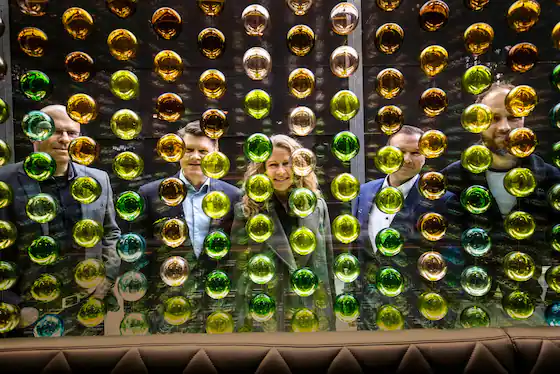
Can finance and sustainability go hand in hand?
– Let’s go to the bank. What about sustainability at UBS?
Harald Egger: Our environmental footprint is important to us. We have been committed to this for forty years and we are the first bank to obtain, already in 1999, the ISO 14001 certification for our activities on a global scale. Since 2020, 100% of our electricity comes from renewable sources. We have set a goal of achieving net zero emissions for our activities by 2025. The solution lies in the energy efficiency and environment of buildings, since they account for 70% of emissions. We pay attention to sustainability during renovations or new construction. For example, our head office in Zurich is LEED Platinum certified and our Bern location is LEED Gold certified. Take advantage of remote heating without fossil energy. But we also have to see what happens inside the buildings. Over the past 20 years, we have reduced our waste by 75%. The fact that we have recycling stations almost everywhere is a huge help.
Florian Hoffmann (laughs): Then I can bring my old coins.
– Luke Nonlist: Sustainability is a great concept, but it is being abused. The concept should not lose its meaning. It must be activated. For the bank, it would be nice to manage the premises according to the canons of energy efficiency, but the real leverage lies in the effect, as well as in the investments of collective capital.
– Harald Egger: In terms of sustainability, we also integrate our suppliers. With them and with our partners, we discuss ways to reduce net greenhouse gas emissions. To do this, we focus first on our suppliers responsible for the largest greenhouse gas emissions within the subcontractor chain. The basic idea is to reduce, not compensate. We are convinced that a good investment in sustainability pays off.
Florian Hoffmann: Yes, it’s about taking into account the entire life cycle of a building. Glass mansions are over. The new building should last three generations. Let’s take the person where we are. It is heated with CO2 neutral energy and all resources are upgraded multiple times. We use the Rhine. Geothermal sensors should also be taken into account. Efficiency improvement always starts with something simple and small. Sustainability is not just about saving energy. Take a closer look at all the materials we use. Here, the rugs and curtains are made from recycled materials, and the seats are made from recycled PET as well. The Coop on campus is the only branch that does not distribute plastic bags.
Thomas Eggerter: The main question is how do we build a CO2 neutral agency. We recheck all the processes so that we can, for example, do without paper completely. So much so that we are currently investing a lot in digital transformation. We check every product we use. As a result, the bank eliminated all single-use water and coffee cups, as well as more than 320 other single-use items.
– Luke Nonlist: This is the right way. Influential players, such as banks and large retailers, must show greater responsibility than the small consumer. Through presentation and marketing, they greatly influence consumer behaviour, as well as production. The sustainable branch of Coop at the Campus Roche site shows that this is possible.
– Thomas Aegerter: We are convinced that focusing on fewer buildings, but with high environmental requirements, has many advantages and improves the ecological footprint. This is why we have sold our Basel building at Aeschenplatz and reduced our presence from three locations to two. In this way, we were able to reduce UBS’s energy consumption in Basel by a third, heating by half and electricity consumption by more than a quarter.
– Florian Hoffmann: In our Basel site, we want to achieve carbon neutrality by 2025. Finally, sustainability is also a topic of communication. As a company, you have to stand out. When we started our urban gardening project, we expected 50 applications at best. However, the interest of the staff far exceeded our expectations. We had to attract participants and now we have a waiting list. In addition, we surveyed employees here in Basel to find out what sustainability means in their daily lives. The result: they are willing to pay more for sustainable products.
Harald Egger: We have similar projects at UBS. In the United States, for example, honey is produced on the rooftop of one of our sites. (Immediately distribute some to accompany the croissants.) And in India, employees grow pepper. In addition, vegetarian menus are in high demand in our company’s canteens.
– Beatrice Sternman: When it comes to sustainability, the business owner plays an important role. But I’ve also noticed that people act differently during their spare time. When they attend big festivals, they forget everything. They use plastic tents and leave them there. They dump their waste anywhere. After me the flood!
Thomas Aegerter: Start small. For example, I am a member of the Organizing Committee for a Regional Gymnastics Championships and we have appointed a member who deals only with the sustainability aspects. In this context, we care about everything. We check every item and every product.

“Organizer. Social media geek. General communicator. Bacon scholar. Proud pop culture trailblazer.”
